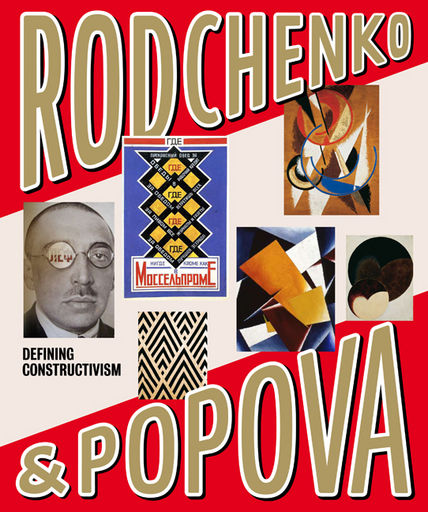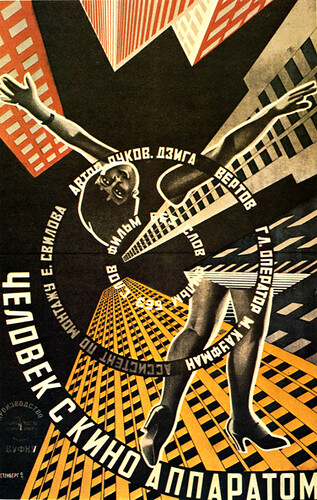
Far more refreshing than the 'Altermodern' Triennial at the Tate Britain, the special exhibition at the Tate Modern, 'Rodchenko and Popova' provides a comprehensive but by no means nauseating retrospective on the art of the revolution, as it flourished before the thermidor of Socialist Realism. If any 20th century art movement should be revived and rethought, I say, it should be Russian Constructivism.
In fact if, as Zizek says, the future will be either socialist or communist - 'socialist' meaning the kind of nanny-state capitalism practised by Western governments in the wake of the financial crisis - for the art world this must mean that the future will be either Altermodern or Constructivist. Art will either remain more or less what it is, a distinct sphere of rationality backed up by specific forms of cultural practices and modes of communication, or it will be sublated in a multidisiplinary network within an overall revolutionary dissolution of separate social spheres and disciplines.

'Altermodern' is clearly the tendency to be opposed, but not so much for the content of the art it takes under its wing - a lot of which, as discussed earlier, can be described as 'postmodern', in spite of its curator Nicolas Bourriaud's proclamation that 'postmodernism is dead' (kind of like Leonard Cohen's lyric... "I fought against the bottle/but I had to do it drunk..."). What should be opposed is not the art but the critical tendency - the mentality of 'out with the old, in with the new' - exemplified in equal measure by buzzwords like 'Altermodern' and by the spectre of Wall Street's return to Marx. ('retro' is now the 'in' thing...)

The issue is not that these are mere 'surface effects' but precisely that they exhibit the opposite or inverse tendency of 'depth without breath', of getting to the bottom of a problem but only after the fact, only when the damage is already done. Why did we need a complete breakdown of the system in order to correct its course, if it is at all a correction? (I personally don't find the idea of bankers reading Das Kapital very convincing.) Or why did we need a total degeneration of the art world into a commercial meat market in order for someone to suggest something is wrong?
What is needed is not merely a new form of art - let alone a new buzzword, a new name, a new way forward or into the depths - but a new way of thinking about the very production process of art and its social function, something which the constructivists, unlike most art movements, sought to do. What is needed is precisely not more depth, nor a different kind of depth, but more breadth: the extension of art into other realms. Let's face it: to what extent does Bourriaud's theorizing really exhibit the traces of a 'universal language'? Isn't the work of "translation" at stake in this 'altermodern' phenomenon merely the transcription of a myriad of untranslatable cultural phenomena into one non-universal and even somewhat esoteric language particular to the foofy contemporary art circuit, and largely unintelligible to the majority of society globally?

The language of lines and forms, on the other hand, is a universal language - if for no other reason than what one could call its 'primitivism'.
Constructivist design for a cup and saucer
But even more so, an art that rejects the notion of "art for art's' sake", an art that believes art must be put to use - in addition to the promise of social change built into its very core and fibre, must speak a universal language in order to exist. It can only exist on condition of extending its breadth, of its expansion into 'non-art'.
At the same time, the constructivist egalitarian rejection of the term 'artist' in favour of 'constructor', the simplification of the process of creation, to demistify art, etc - hints at the postmodern 'death of the author'; in both cases the aim is to undermine the privileged position of the speaker/author/artist as the arbiter of meaning or aesthetic value in favour of a configuration where the very dichotomy of author/consumer becomes false. Art for the people.
In this context the reference to 'modern' in 'altermodern', and the call "death to postmodernism" can be read as the thermidorian gesture of restoring order, repeating Stalin's gesture of outlawing constructivism and proclaiming Socialist Realism as the only acceptable form of art.
Constructivist clothing design: clearly the future
Another thing worth thinking about is the constructivists' involvement in advertising, and their insistence on not rejecting it as a capitalist consumerist ploy. There is something to this: for how can one confront the phenomenon of advertising at all, if not with advertising itself - either in the form of subversive re-production (i.e. Adbusters) or in the form of counter-advertising, advertising for the right causes?
The Adbusters slogan for what they have dubbed 'Buy Nothing day', November 22, has a distinctly constructivist ring: MAKE SOMETHING - BUY NOTHING.
From now on, I am no longer the author of this blog, but its chief constructor.
Monday, 20 April 2009
Constructivism and the Future
Subscribe to:
Post Comments (Atom)

No comments:
Post a Comment